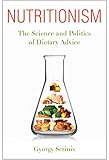Nutritionism : The Science and Politics of Dietary Advice.
By: Scrinis, Gyorgy.
Series: Publisher: New York : Columbia University Press, 2013Description: (352 pages).ISBN: 9780231156578; electronic bk..Genre/Form: Print books.| Current location | Call number | Status | Date due | Barcode | Item holds |
|---|---|---|---|---|---|
| On Shelf | RA784 .S435 2013 (Browse shelf) | Available | AU0000000005206 |
Browsing Alfaisal University Shelves , Shelving location: On Shelf Close shelf browser

|

|

|

|

|

|

|
||
| RA784 .N462 2013 Why calories count : from science to politics / | RA784 .N482 2018 Food and nutrition : what everyone needs to know / | RA784 .R3823 2020 Eat like the animals : what nature teaches us about the science of healthy eating / | RA784 .S435 2013 Nutritionism : The Science and Politics of Dietary Advice. | RA784 .S6557 2018 Nutrition for sport, exercise, and health / | RA784 .S722 2015 The diet myth : why the secret to health and weight loss is already in your gut / | RA784 .T35 2017 Taking sides : clashing views in food and nutrition / |
Cover -- Half title -- Series Page -- Title -- Copyright -- Contents -- List of Abbreviations -- 1. A Clash of Nutritional Ideologies -- 2. The Nutritionism Paradigm: Reductive Approaches to Nutrients, Food, and the Body -- 3. The Era of Quantifying Nutritionism: Protective Nutrients, Caloric Reductionism, and Vitamania -- 4. The Era of Good-and-Bad Nutritionism: Bad Nutrients and Nutricentric Dietary Guidelines -- 5. The Macronutrient Diet Wars: From the Low-Fat Campaign to Low-Calorie, Low-Carb, and Low-GI Diets -- 6. Margarine, Butter, and the Trans-Fats Fiasco -- 7. The Era of Functional Nutritionism: Functional Nutrients, Superfoods, and Optimal Dietary Patterns -- 8. Functional Foods: Nutritional Engineering, Nutritional Marketing, and Corporate Nutritionism -- 9. The Food Quality Paradigm: Alternative Approaches to Food and the Body -- 10. After Nutritionism -- Acknowledgments -- Appendix: The Nutritionism and Food Quality Lexicon -- Notes -- Index.
Access restricted to ANU staff and students only. ANU.
Popularized by Michael Pollan in his best-selling In Defense of Food, Gyorgy Scrinis's concept of nutritionism refers to the reductive understanding of nutrients as the key indicators of healthy foodan approach that has dominated nutrition science, dietary advice, and food marketing. Scrinis argues this ideology has narrowed and in some cases distorted our appreciation of food quality, such that even highly processed foods may be perceived as healthful depending on their content of good" or bad" nutrients. Investigating the butter versus margarine debate, the battle between low-fat, low-carb, and other weight-loss diets, and the food industry's strategic promotion of nutritionally enhanced foods, Scrinis reveals the scientific, social, and economic factors driving our modern fascination with nutrition. Scrinis develops an original framework and terminology for analyzing the characteristics and consequences of nutritionism since the late nineteenth century. He begins with the era of quantification, in which the idea of protective nutrients, caloric reductionism, and vitamins' curative effects took shape. He follows with the era of good and bad nutritionism, which set nutricentric dietary guidelines and defined the parameters of unhealthy nutrients; and concludes with our current era of functional nutritionism, in which the focus has shifted to targeted nutrients, superfoods, and optimal diets. Scrinis's research underscores the critical role of nutrition science and dietary advice in shaping our relationship to food and our bodies and in heightening our nutritional anxieties. He ultimately shows how nutritionism has aligned the demands and perceived needs of consumers with the commercial interests of food manufacturers and corporations. Scrinis also offers an alternative paradigm for assessing the healthfulness of foodsthe food quality.
paradigmthat privileges food production and processing quality, cultural-traditional knowledge, and sensual-practical experience, and promotes less reductive forms of nutrition research and dietary advice.
eBook access via Internet.


